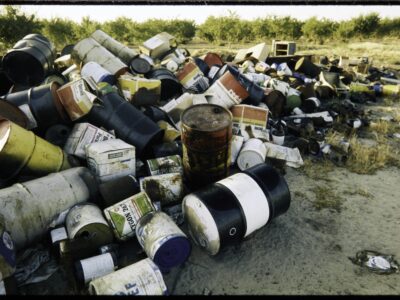Why Don’t States Implement the Polluter Pays Principle?
An economic analysis suggests why not
Some time ago, I was thinking about the “polluter pays” principle of international environmental law. In this, the source — not its receiving victim — of pollution or other environmental harm should pay for any remediation done and for ending the pollution. Yet despite the principle’s normative appeal, countries (or “states” in the language of international law and international relations) generally don’t implement it among themselves: Of the international agreements that are in effect and that contain the principle, about half are European only and the other half invoke it in a non-binding way. To explore and explain this lack of implementation, I used an economic analysis, which is described in my recently-published paper “An economic analysis of international environmental rights” (a pre-print of which [PDF] can be found on my personal website). I summarize it here.

Imagine two adjacent property owners. To use a classic example, one is a coal-fired electricity generator and the other a commercial laundry facility. The former’s sooty exhaust interferes with the latter’s business. Should the electricity generator have a right to emit, or should the laundry have a right to clean air? Under a polluter pays rule, the latter would be the case, and the electricity generator would have to pay the laundry for the harm to its business. Although most environmentally minded people would back a right to clean air, there may be reasons not to. What if the electricity generator was established long before the laundry arrived? What if the harm to the laundry was minimal? This is a question of the initial allocation of property rights. That is, in the absence of agreements otherwise, what rights does ownership entail? The Coase Theorem says that who has the initial right does not matter to the final outcome, assuming that transaction costs to reaching a possible agreement to exchange are low. If one party values the right more than that with the initial allocation, they will strike a deal to transfer the right and exchange compensation, perhaps via a contract. If not, then they won’t agree. However, Robert Cooter noted [PDF] that transaction costs are often high enough to prevent welfare-increasing bargains, so the law should try to allocate the initial right to whoever is likely to value it more. This way, welfare will be higher even if the parties cannot reach an agreement.
In some ways, states are like property owners. They have rights to possess, use, transfer, reap the benefits of, and exclude others from their sovereign territories, and perhaps rights to be free from harm from others. They can negotiate and agree to exchange some of these rights through a treaty, which resembles a contract in private law. Transaction costs to reaching an agreement are particularly high in international negotiations, for a variety of reasons. Because of this, the initial allocation of their quasi-property rights (which I call “sovereignty rights”) will be important.
What is the initial allocation of “sovereignty rights” among states? Here, “initial entitlement” does not mean the earliest entitlement that one can reconstruct, but instead is a baseline of states’ sovereignty rights in the absence of treaties. In my paper, I consider and reject two possible initial allocations, based upon practice and theory. In the first, states would have the right to cause transboundary environmental harm and to deplete shared natural resources. This is sort of a default, in that in the absence of a centralized enforcer of international law, states can pollute across their boundaries but they cannot physically block incoming pollution. And indeed, such a right to pollute (and to exploit transboundary natural resources) was the initial allocation until the twentieth century. Second, states could in principle have a right to be free of transboundary environmental harm, including depletion of their shared natural resources. In a way, this is what an international implementation of the polluter pays principle would look like. Although some countries and treaties rhetorically nod to an international polluter pays principle, as noted above, they don’t actually carry it out (at least outside of Europe).
Instead, what we see since the mid twentieth century or so is a mixed regime, in which states may cause transboundary environmental risks but have a duty of care with a due diligence standard. Likewise, they may exploit shared natural resources but must do so equitably. Each of these general tenets confers some rights on potential victims of transboundary environmental harm. This entitlement appears relatively efficient — that is, welfare-maximizing — in contemporary circumstances. What’s more, the relevant legal instruments that describe this initial allocation reveal an implicit underlying economic logic.
Legal school Bruce Ackerman called the economic analysis of law “the most important development in legal scholarship of the twentieth century.” It has helped explain, predict, and critique the domestic law of property, contracts, torts, crime, and legal process. My sense is that it is under-applied in the international domain.
Reader Comments
One Reply to “Why Don’t States Implement the Polluter Pays Principle?”
Comments are closed.







“…states could in principle have a right to be free of transboundary environmental harm, including depletion of their shared natural resources. In a way, this is what an international implementation of the polluter pays principle would look like.”
The PPP is formulated as a “liability rule” (Calabresi & Melamed), but you seem to be treating it is a “property rule”. Even accepting your assumption that the “entitlement” should be allocated according to the principles of economic efficiency, it is difficult to see why the efficient polluting state shouldn’t compensate the states that are harmed, regardless of whether the pollution was welfare-enhancing or not. As Calabresi & Melamed argue, even assuming high transaction costs, a liability rule would be largely efficient and usually better from the standpoint of distributive justice.